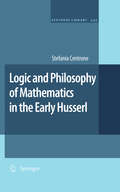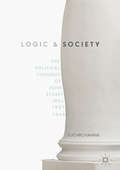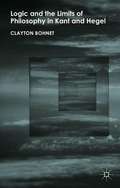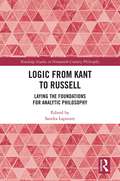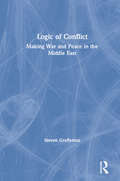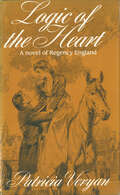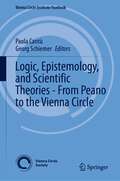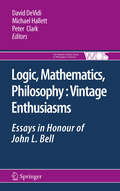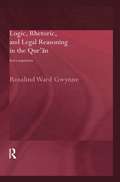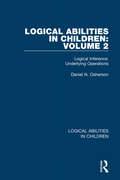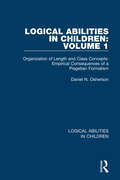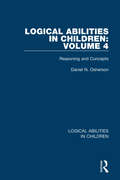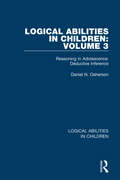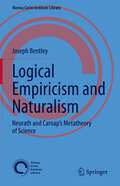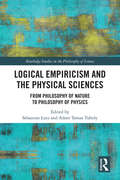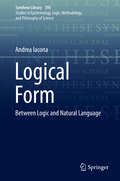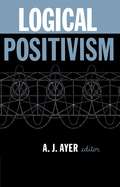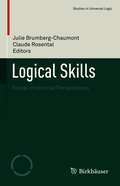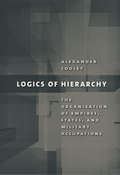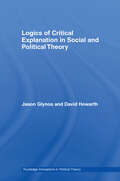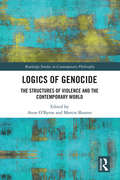- Table View
- List View
Logic and Philosophy of Mathematics in the Early Husserl
by Stefania CentroneLogic and Philosophy of Mathematics in the Early Husserl focuses on the first ten years of Edmund Husserl's work, from the publication of his Philosophy of Arithmetic (1891) to that of his Logical Investigations (1900/01), and aims to precisely locate his early work in the fields of logic, philosophy of logic and philosophy of mathematics. Unlike most phenomenologists, the author refrains from reading Husserl's early work as a more or less immature sketch of claims consolidated only in his later phenomenology, and unlike the majority of historians of logic she emphasizes the systematic strength and the originality of Husserl's logico-mathematical work. The book attempts to reconstruct the discussion between Husserl and those philosophers and mathematicians who contributed to new developments in logic, such as Leibniz, Bolzano, the logical algebraists (especially Boole and Schröder), Frege, and Hilbert and his school. It presents both a comprehensive critical examination of some of the major works produced by Husserl and his antagonists in the last decade of the 19th century and a formal reconstruction of many texts from Husserl's Nachlaß that have not yet been the object of systematical scrutiny. This volume will be of particular interest to researchers working in the history, and in the philosophy, of logic and mathematics, and more generally, to analytical philosophers and phenomenologists with a background in standard logic.
Logic and Philosophy of Mathematics in the Early Husserl (Synthese Library #345)
by Stefania CentroneLogic and Philosophy of Mathematics in the Early Husserl focuses on the first ten years of Edmund Husserl’s work, from the publication of his Philosophy of Arithmetic (1891) to that of his Logical Investigations (1900/01), and aims to precisely locate his early work in the fields of logic, philosophy of logic and philosophy of mathematics. Unlike most phenomenologists, the author refrains from reading Husserl’s early work as a more or less immature sketch of claims consolidated only in his later phenomenology, and unlike the majority of historians of logic she emphasizes the systematic strength and the originality of Husserl’s logico-mathematical work. The book attempts to reconstruct the discussion between Husserl and those philosophers and mathematicians who contributed to new developments in logic, such as Leibniz, Bolzano, the logical algebraists (especially Boole and Schröder), Frege, and Hilbert and his school. It presents both a comprehensive critical examination of some of the major works produced by Husserl and his antagonists in the last decade of the 19th century and a formal reconstruction of many texts from Husserl’s Nachlaß that have not yet been the object of systematical scrutiny. This volume will be of particular interest to researchers working in the history, and in the philosophy, of logic and mathematics, and more generally, to analytical philosophers and phenomenologists with a background in standard logic.
Logic and Society: The Political Thought of John Stuart Mill, 1827-1848
by Yuichiro KawanaThis book discusses John Stuart Mill’s intellectual activity from about 1827 to 1848, namely between his recovery from his so-called ‘Mental Crisis’ and the publication of Principles of Political Economy. During this period, along with deepening his understanding of contemporary society as commercial civilization, Mill aspired to create a new system of science of society which would inquire into the nature, process of historical change, and prospects of society. Among the indispensable constituent sciences of his system, this book pays particular attention on his projected sciences of history and of the formation of character (ethology), and clarifies that the implications of his interest in these sciences were more significant for the better understanding of Mill’s political thought than many scholars have assumed.
Logic and the Limits of Philosophy in Kant and Hegel
by Clayton BohnetThis text examines the boundary between philosophy and formal logic in Kant and Hegel. It takes up the particular category of 'quantity' as a point around which to explore Kant's and Hegel's larger architectonic concerns. Analysis of the relation in Kant between quantity in formal logic and in his transcendental logic reveals two complementary but distinct approaches that preserve the boundary between philosophy and formal logic. By contrast, in Hegel's Science of Logic we find both a novelapproach to the traditional treatment of quantity in logic, and a reconstruction of the relation of logic to all other determinations of thought. By basing its examination of the relation of formal logic and philosophy in Kant and Hegel on a detailed analysis of quantity, Logic and the Limits of Philosophy in Kant and Hegel provides a resource for an historically informed interpretation of the revolutions in logic that marked the onset of our digital age.
Logic from Kant to Russell: Laying the Foundations for Analytic Philosophy (Routledge Studies in Nineteenth-Century Philosophy)
by Sandra LapointeThe scope and method of logic as we know it today eminently reflect the ground-breaking developments of set theory and the logical foundations of mathematics at the turn of the 20th century. Unfortunately, little effort has been made to understand the idiosyncrasies of the philosophical context that led to these tremendous innovations in the 19thcentury beyond what is found in the works of mathematicians such as Frege, Hilbert, and Russell. This constitutes a monumental gap in our understanding of the central influences that shaped 19th-century thought, from Kant to Russell, and that helped to create the conditions in which analytic philosophy could emerge. The aim of Logic from Kant to Russell is to document the development of logic in the works of 19th-century philosophers. It contains thirteen original essays written by authors from a broad range of backgrounds—intellectual historians, historians of idealism, philosophers of science, and historians of logic and analytic philosophy. These essays question the standard narratives of analytic philosophy’s past and address concerns that are relevant to the contemporary philosophical study of language, mind, and cognition. The book covers a broad range of influential thinkers in 19th-century philosophy and analytic philosophy, including Kant, Bolzano, Hegel, Herbart, Lotze, the British Algebraists and Idealists, Moore, Russell, the Neo-Kantians, and Frege.
Logic of Conflict: Making War and Peace in the Middle East
by Steven GreffeniusThe author’s argument ties this literature to a field that is often called the logic of inquiry. He criticizes an influential and deliberately analytical approach to the study of international conflict and show what can be gained by bringing more integrative or synthetic approaches to bear on problems in the field. The study started as an effort to work out some problems in international relations theory and it has remained that through eight years of writing and research. Still, the book is more than incidentally about the Middle East, and evidence from the region informs the argument made here. This evidence is of two kinds: traditional historical material from both primary and secondary sources, and data on events that have occurred during the course of both conflictual and cooperative exchanges between the actors there. The treatment focuses on the relationship between Egypt and Israel between 1967 and 1979, a period that saw their relations pass from the most intense antagonism to a reasonable degree of comity if not friendship.
Logic of the Heart: A Novel of Regency England (Sanguinet Saga)
by Patricia VeryanPatricia Veryan's delightful Regency novels have inspired Library Journal to call her "the superstar of the period romance" and The Chattanooga Times to hail her as "a worthy successor to Georgette Heyer at her very best." In Logic of the Heart, once again she brings us an irresistible blend of love and danger when she matches the enchanting Susan Henley with dashing Valentine Montclair...
Logic, Epistemology, and Scientific Theories - From Peano to the Vienna Circle (Vienna Circle Institute Yearbook #29)
by Georg Schiemer Paola CantùThis book provides a collection of chapters on the development of scientific philosophy and symbolic logic in the early twentieth century. The turn of the last century was a key transitional period for the development of symbolic logic and scientific philosophy. The Peano school, the editorial board of the Revue de Métaphysique et de Morale, and the members of the Vienna Circle are generally mentioned as champions of this transformation of the role of logic in mathematics and in the sciences. The scholarship contained provides a rich historical and philosophical understanding of these groups and research areas. Specifically, the contributions focus on a detailed investigation of the relation between structuralism and modern mathematics. In addition, this book provides a closer understanding of the relation between symbolic logic and previous traditions such as syllogistics. This volume also informs the reader on the relation between logic, the history and didactics in the Peano School. This edition appeals to students and researchers working in the history of philosophy and of logic, philosophy of science, as well as to researchers on the Vienna Circle and the Peano School.
Logic, Mathematics, Philosophy, Vintage Enthusiasms
by Peter Clark David Devidi Michael HallettThe volume includes twenty-five research papers presented as gifts to John L. Bell to celebrate his 60th birthday by colleagues, former students, friends and admirers. Like Bell's own work, the contributions cross boundaries into several inter-related fields. The contributions are new work by highly respected figures, several of whom are among the key figures in their fields. Some examples: in foundations of maths and logic (William Lawvere, Peter Aczel, Graham Priest, Giovanni Sambin); analytical philosophy (Michael Dummett, William Demopoulos), philosophy of science (Michael Redhead, Frank Arntzenius), philosophy of mathematics (Michael Hallett, John Mayberry, Daniel Isaacson) and decision theory and foundations of economics (Ken Bimore). Most articles are contributions to current philosophical debates, but contributions also include some new mathematical results, important historical surveys, and a translation by Wilfrid Hodges of a key work of arabic logic.
Logic, Rhetoric and Legal Reasoning in the Qur'an: God's Arguments (Routledge Studies in the Qur'an)
by Rosalind Ward GwynneMuslims have always used verses from the Qur'an to support opinions on law, theology, or life in general, but almost no attention has been paid to how the Qur'an presents its own precepts as conclusions proceeding from reasoned arguments. Whether it is a question of God's powers of creation, the rationale for his acts, or how people are to think clearly about their lives and fates, Muslims have so internalized Qur'anic patterns of reasoning that many will assert that the Qur'an appeals first of all to the human powers of intellect. This book provides a new key to both the Qur'an and Islamic intellectual history. Examining Qur'anic argument by form and not content helps readers to discover the significance of passages often ignored by the scholar who compares texts and the believer who focuses upon commandments, as it allows scholars of Qur'anic exegesis, Islamic theology, philosophy, and law to tie their findings in yet another way to the text that Muslims consider the speech of God.
Logical Abilities in Children: Logical Inference: Underlying Operations (Logical Abilities in Children #2)
by Daniel N. OshersonOriginally published in 1974, the second volume of four (Logical Inference: Underlying Operations) provides a process-model for the solution of certain syllogistic reasoning problems. Testable predictions of the model are easily derived, and the available evidence supports the model’s description of the real-time mental steps mediating these logical abilities. A theory of development, connected to the model, makes these volumes all the more important for cognitive, developmental, and educational psychologists, as well as educators and linguists.
Logical Abilities in Children: Organization of Length and Class Concepts: Empirical Consequences of a Piagetian Formalism (Logical Abilities in Children #1)
by Daniel N. OshersonOriginally published in 1974, a wide and interesting set of intellectual abilities in children are examined here. Volume 1 of 4 (Organization of Length and Class Concepts: Empirical Consequences of a Piagetian Formalism) converts an axiomatization of classes and asymmetrical relationships (proper to Piaget’s discipline of Genetic Epistemology) into a model of the development of these notions in children. Here may be one of the only attempts to derive predictive consequences from the more philosophically oriented writings of the Genevan School.
Logical Abilities in Children: Reasoning and Concepts (Logical Abilities in Children #4)
by Daniel N. OshersonOriginally published in 1976, this fourth and final volume in a series that met with critical acclaim is concerned with a certain kind of answer to the question "What distinguishes the concepts that are a natural part of human languages from those that are merely expressible in language?" The kind of answers contemplated rely on formal properties of the logics that overlay the two sorts of concepts. The author presents a substantive theory of natural concepts which helps to make concrete the methodological proposals. In order to make the theory more manageable, it is restricted to sentential modifiers expressed in English. Although these proposals are substantive, the methodology they exemplify may be of even more significance. Some of the ideas in the author’s approach derive from the work of Chomsky, and several issues relevant to the growth of logical thinking are also treated with data that speak to questions raised in Volume 3, concerning qualitative change through development. This final volume in the series will be essential reading for all concerned with both logical abilities in children, their development, and novel methodological approaches to research bearing on this and related issues.
Logical Abilities in Children: Reasoning in Adolescence: Deductive Inference (Logical Abilities in Children #3)
by Daniel N. OshersonOriginally published in 1975, this volume (3 of 4) presents an expanded model of certain deductive abilities in children and adults. A partial explanation of the growth of these abilities was suggested in Volume 2 of this series, and it is amplified here, both with regard to propositional logic and the logic of class inclusion. A new methodology is employed, the issue of the effect of content in deductive reasoning is covered, and developmental questions are reformulated. Although only data from experiments with adolescents are presented here, the volume sets the stage for potentially illustrating developmental comparisons, a topic pursued in Volume 4 of this novel and inventive series.
Logical Empiricism and Naturalism: Neurath and Carnap’s Metatheory of Science (Vienna Circle Institute Library)
by Joseph BentleyThis text provides an extensive exploration of the relationship between the thought of Otto Neurath and Rudolf Carnap, providing a new argument for the complementarity of their mature philosophies as part of a collaborative metatheory of science. In arguing that both Neurath and Carnap must be interpreted as proponents of epistemological naturalism, and that their naturalisms rest on shared philosophical ground, it is also demonstrated that the boundaries and possibilities for epistemological naturalism are not as restrictive as Quinean orthodoxy has previously suggested. Both building on and challenging the scholarship of the past four decades, this naturalist reading of Carnap also provides a new interpretation of Carnap’s conception of analyticity, allowing for a refutation of the Quinean argument for the incompatibility of naturalism and the analytic/synthetic distinction. In doing so, the relevance and potential importance of their scientific meta-theory for contemporary questions in the philosophy of science is demonstrated.This text appeals to students and researchers working on Logical Empiricism, Quine, the history of analytic philosophy and the history of philosophy of science, as well as proponents of naturalized epistemology.
Logical Empiricism and the Physical Sciences: From Philosophy of Nature to Philosophy of Physics (Routledge Studies in the Philosophy of Science)
by Sebastian Lutz; Adam Tamas TubolyThis volume has two primary aims: to trace the traditions and changes in methods, concepts, and ideas that brought forth the logical empiricists’ philosophy of physics and to present and analyze the logical empiricists’ various and occasionally contrary ideas about the physical sciences and their philosophical relevance. These original chapters discuss these developments in their original contexts and social and institutional environments, thus showing the various fruitful conceptions and philosophies behind the history of 20th-century philosophy of science. Logical Empiricism and the Natural Sciences is divided into three thematic sections. Part I surveys the influences on logical empiricism’s philosophy of science and physics. It features chapters on Maxwell’s role in the worldview of logical empiricism, on Reichenbach’s account of objectivity, on the impact of Poincaré on Neurath’s early views on scientific method, Frank’s exchanges with Einstein about philosophy of physics, and on the forgotten role of Kurt Grelling. Part II focuses on specific physical theories, including Carnap’s and Reichenbach’s positions on Einstein’s theory of general relativity, Reichenbach’s critique of unified field theory, and the logical empiricists’ reactions to quantum mechanics. The third and final group of chapters widens the scope to philosophy of science and physics in general. It includes contributions on von Mises’ frequentism; Frank’s account of concept formation and confirmation; and the interrelations between Nagel’s, Feigl’s, and Hempel’s versions of logical empiricism. This book offers a comprehensive account of the logical empiricists’ philosophy of physics. It is a valuable resource for researchers interested in the history and philosophy of science, philosophy of physics, and the history of analytic philosophy.
Logical Fictions in Medieval Literature and Philosophy
by Virginie GreeneIn the twelfth and thirteenth centuries, new ways of storytelling and inventing fictions appeared in the French-speaking areas of Europe. This new art still influences our global culture of fiction. Virginie Greene explores the relationship between fiction and the development of neo-Aristotelian logic during this period through a close examination of seminal literary and philosophical texts by major medieval authors, such as Anselm of Canterbury, Abélard, and Chrétien de Troyes. This study of Old French logical fictions encourages a broader theoretical reflection about fiction as a universal human trait and a defining element of the history of Western philosophy and literature. Additional close readings of classical Greek philosophers Plato and Aristotle, and modern analytic philosophy including the work of Bertrand Russell and Rudolf Carnap, demonstrate peculiar traits of Western rationalism and expose its ambivalent relationship to fiction.
Logical Form: Between Logic and Natural Language (Synthese Library #393)
by Andrea IaconaLogical form has always been a prime concern for philosophers belonging to the analytic tradition. For at least one century, the study of logical form has been widely adopted as a method of investigation, relying on its capacity to reveal the structure of thoughts or the constitution of facts. This book focuses on the very idea of logical form, which is directly relevant to any principled reflection on that method. Its central thesis is that there is no such thing as a correct answer to the question of what is logical form: two significantly different notions of logical form are needed to fulfill two major theoretical roles that pertain respectively to logic and to semantics. This thesis has a negative and a positive side. The negative side is that a deeply rooted presumption about logical form turns out to be overly optimistic: there is no unique notion of logical form that can play both roles. The positive side is that the distinction between two notions of logical form, once properly spelled out, sheds light on some fundamental issues concerning the relation between logic and language.
Logical Positivism (The Library Of Philosophical Movements)
by A. J. AyerEdited by a leading exponent of the school, this book offers--in the words of the movement's founders--logical positivism's revolutionary theories on meaning and metaphysics, the nature of logic and mathematics, the foundations of knowledge, the content of psychological propositions, ethics, sociology, and the nature of philosophy itself.
Logical Skills: Social-Historical Perspectives (Studies in Universal Logic)
by Claude Rosental Julie Brumberg-ChaumontThis contributed volume explores the ways logical skills have been perceived over the course of history. The authors approach the topic from the lenses of philosophy, anthropology, sociology, and history to examine two opposing perceptions of logic: the first as an innate human ability and the second as a skill that can be learned and mastered. Chapters focus on the social and political dynamics of the use of logic throughout history, utilizing case studies and critical analyses.Specific topics covered include:the rise of logical skillsproblems concerning medieval notions of idiocy and rationalitydecolonizing natural logicnatural logic and the course of timeLogical Skills: Social-Historical Perspectives will appeal to undergraduate and graduate students, as well as researchers in the fields of history, sociology, philosophy, and logic. Psychology and colonial studies scholars will also find this volume to be of particular interest.
Logicism and its Philosophical Legacy
by William DemopoulosThe idea that mathematics is reducible to logic has a long history, but it was Frege who gave logicism an articulation and defense that transformed it into a distinctive philosophical thesis with a profound influence on the development of philosophy in the twentieth century. This volume of classic, revised and newly written essays by William Demopoulos examines logicism's principal legacy for philosophy: its elaboration of notions of analysis and reconstruction. The essays reflect on the deployment of these ideas by the principal figures in the history of the subject - Frege, Russell, Ramsey and Carnap - and in doing so illuminate current concerns about the nature of mathematical and theoretical knowledge. Issues addressed include the nature of arithmetical knowledge in the light of Frege's theorem; the status of realism about the theoretical entities of physics; and the proper interpretation of empirical theories that postulate abstract structural constraints.
Logics Of Hierarchy: The Organization of Empires, States, and Military Occupations
by Alexander CooleyPolitical science has had trouble generating models that unify the study of the formation and consolidation of various types of states and empires. The business-administration literature, however, has long experience in observing organizations. According to a dominant model in this field, business firms generally take one of two forms: unitary (U) or multidivisional (M). The U-form organizes its various elements along the lines of administrative functions, whereas the M-form governs its periphery according to geography and territory. In Logics of Hierarchy, Alexander Cooley applies this model to political hierarchies across different cultures, geographical settings, and historical eras to explain a variety of seemingly disparate processes: state formation, imperial governance, and territorial occupation. Cooley illustrates the power of this formal distinction with detailed accounts of the experiences of Central Asian republics in the Soviet and post-Soviet eras, and compares them to developments in the former Yugoslavia, the governance of modern European empires, Korea during and after Japanese occupation, and the recent U. S. occupation of Iraq. In applying this model, Logics of Hierarchy reveals the varying organizational ability of powerful states to promote institutional transformation in their political peripheries and the consequences of these formations in determining pathways of postimperial extrication and state-building. Its focus on the common organizational problems of hierarchical polities challenges much of the received wisdom about imperialism and postimperialism.
Logics of Critical Explanation in Social and Political Theory (Routledge Innovations in Political Theory #Vol. 26)
by David Howarth Jason GlynosThis book proposes a novel approach to practising social and political analysis based on the role of logics. The authors articulate a distinctive perspective on social science explanation that avoids the problems of scientism and subjectivism by steering a careful course between lawlike explanations and thick descriptions. Drawing upon hermeneutics, poststructuralism, psychoanalysis, and post-analytical philosophy, this new approach offers a particular set of logics – social, political and fantasmatic – with which to construct critical explanations of practices and regimes. While the first part of the book critically engages with lawlike, interpretivist and causal approaches to critical explanation, the second part elaborates an alternative grammar of concepts informed by an ontological stance rooted in poststructuralist theory. In developing this approach, a number of empirical cases are included to illustrate its basic concepts and logics, ranging from the apartheid regime in South Africa to recent changes in higher education. The book will be a valuable tool for scholars and researchers in a variety of related fields of study in the social sciences, especially the disciplines of political science and political theory, international relations, social theory, cultural studies, anthropology and philosophy.
Logics of Disintegration: Post-Structuralist Thought and the Claims of Critical Theory
by Peter DewsThis book examines the relationship between post-structuralism and Frankfurt School critical theory. It also questions the "novelty" of post-structuralist claims, using, for instance, the debate between Fichte and Schelling to show that such terrain as radical subjectivity has been broached before. The book explores the danger of allowing post-structuralism to remain unchecked and the possible "disastrous" political consequences of such a "radical" theory.
Logics of Genocide: The Structures of Violence and the Contemporary World (Routledge Studies in Contemporary Philosophy)
by Martin Shuster Anne O’ByrneThis book is concerned with the connection between the formal structure of agency and the formal structure of genocide. The contributors employ philosophical approaches to explore the idea of genocidal violence as a structural element in the world. Do mechanisms or structures in nation-states produce types of national citizens that are more susceptible to genocidal projects? There are powerful arguments within philosophy that in order to be the subjects of our own lives, we must constitute ourselves specifically as national subjects and organize ourselves into nation states. Additionally, there are other genocidal structures of human society that spill beyond historically limited episodes. The chapters in this volume address the significance—moral, ethical, political—of the fact that our very form of agency suggests or requires these structures. The contributors touch on topics including birthright citizenship, contemporary mass incarceration, anti-black racism, and late capitalism. Logics of Genocide will be of interest to scholars and advanced students working in philosophy, critical theory, genocide studies, Holocaust and Jewish studies, history, and anthropology.
